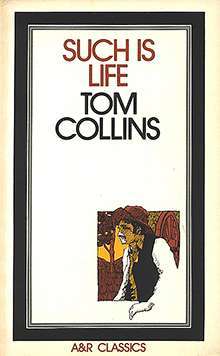 I’m currently re-reading (for what must be the fifth or sixth time) Such is Life, by Tom Collins, which in itself tells you that this is one of my favourite books.
I’m currently re-reading (for what must be the fifth or sixth time) Such is Life, by Tom Collins, which in itself tells you that this is one of my favourite books.
It’s regarded – deservedly, in my opinion – as a classic of Australian literature but I don’t know many people who’ve actually read it, which is a shame because it’s a book that bears much discussion.
For a start (pun intended), it has what I regard as one of the best opening lines of all time: “Unemployed, at last!”. What an opening!
The book’s title refers to the purported last words of Ned Kelly when he was hanged in 1880, and is used throughout the book as a punctuation on life’s twists and turns.
Written in 1897, Such is Life wasn’t published until 1903 and only began to be recognised for its virtues in the 1940s. The author’s name is the pseudonym of Joseph Furphy and his choice of a slang term for a hoax (look up how the cocktail got its name) tells you much about his approach.
Funnily enough, Furphy wrote Such is Life well before his own surname became a byword for an untrue story or a false belief. This came about during WWI, when his family’s travelling water carts became the centre of tall tales and local gossip, an old-fashioned version of the office water cooler.
Such is Life purports to be extracts from the diary of Tom Collins, a learned bushman and former Government Deputy-Assistant-Sub-Inspector, as he travels among the farmers, drovers and townsfolk of late 19th century southern NSW and northern Victoria, supposedly told with an “inveterate truthfulness”.
In this, Tom is a perfect example of the unreliable narrator, frequently oblivious to what’s really going on. The reader picks up on facts and anecdotes shared by other characters in conversation, which Tom mostly misunderstands or ignores.
This is despite – or maybe because of – Tom being ferociously articulate and literate, albeit in limited ways. He has a daunting familiarity with, and ability to quote from, the Bible and Shakespeare, and those two sources shape his otherwise limited perception of his world and people in it.
Tom rarely uses words of one syllable when four will do, is pompous and bombastic, and frequently digresses into conversations (often with himself) on matters of deep philosophical, historical and psychological importance, while managing to ignore the real world around him.
It’s a marvellous feat of self-deception that Furphy draws the reader into, but it does require effort. Apart from the many Biblical and Shakespearean references, and Tom’s often ridiculous verbosity, the diarist also chooses to self-censor to a confusing degree, not only blanking out the names of local people who might be offended (remembering that they are, in fact, fictional) and words that might be considered rude (he never uses “bloody” despite its frequent occurrence in conversation, transposing “the sanguinary adjective” instead), but also transcribing Scottish, Irish and Chinese accents in language that is difficult to decipher unless you read it aloud.
With all these narrator/diarist, truth/fiction, words/accents shenanigans, Such is Life is sometimes regarded as a difficult book to read. Personally, I find that each time I read it, I understand it a little better and get more enjoyment out of it.
The other aspect I’d draw attention to – and I believe this is where Furphy’s genius and real value as a writer lies – is that in the course of Tom’s diary, he paints an indelible portrait of the times, the people and the countryside of rural 19th century Australia.
Furphy’s depictions of the landscape, the weather, the animals, and – especially – the people of the Riverina, all contribute to a depiction of life in a barely post-colonial, regional Australia that ranks with the greatest works of Miles Franklin, Henry Handel Richardson, and Henry Lawson. Its bias is, as Furphy himself explained, “offensively Australian”.
Indeed, it doesn’t surprise me that Such is Life is rightfully compared to Mark Twain’s accounts of life on the Mississippi, or the England that emerges from Charles Dickens’ novels.
For its wit, its erudition, its playfulness and its portrait of a quintessentially Australian time and place, I’ve no doubt I’ll read Such is Life many more times.